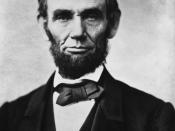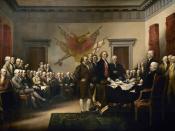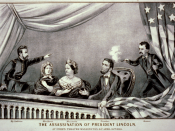Two of the most prestigious and respected leaders of the United States of America, Thomas Jefferson and Abraham Lincoln, are notable for their great speeches and written works because they not only instilled patriotism in the American audiences, but unity, hope, and history as well. Examples of these skills are clearly found in Jefferson's Declaration of Independence and Lincoln's Gettysburg Address, for each of these documents is a solid, memorable piece in style and historical support.
Both pieces begin with many similar key factors, establishing affinity between the speaker and his audience on the concrete basis of a common background. Jefferson does not say "I hold these truths..." or "the government" or even "you, the public" when beginning his famous declaration. The first word of The Declaration of Independence is "We". "We hold these truths to be self-evident..." creates a bond between Jefferson and the reader. He acknowledges them as an equal before even finishing his sentence.
This will not only serve as an illustration for equality between the American public and himself, but with the entire governing system. In breaking away from Mother Europe, the United States sought to build a country where no one person was placed above the common man and therefore had a lesser chance of eventual corruption. Jefferson's inclusion of the reader, the common man, symbolizes this unanimous desire.
Abraham Lincoln too, unifies his audience with his eloquent streams of words in the Gettysburg Address. He explains to the reader that "our fathers..." were the ones to create a new, liberated nation, and for this reason we are to this day equal in all of our prospective endeavors. Obviously, if he states that we all came from the same historical "fathers", then we are in that respect not only equal, but bound to...


